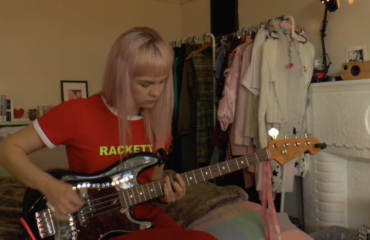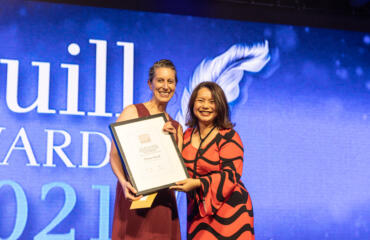Cinemas across the country will air a one-minute video highlighting the prevalence of child abuse in Australia.
The video was developed as part of the 2014 ‘1 in 4’ campaign by Adults Surviving Child Abuse (ASCA). It shows four men around a barbecue and notes that one may have experienced abuse or trauma as a child.
Cathy Kezelman, ASCA president, says it is important for people watching the film to be aware of local support services that are available.

“I certainly feel that survivors in the audience — and I include myself in that — could be really affected by the film. I do think it would be preferable to pre-empt those feelings and certainly offer some pathways if you’re feeling upset.”
While it is common for news media organisations to include trigger warnings or contact details for support services alongside particularly distressing content, it is rare for dramatic films to take similar precautions.
The ad doesn’t offer any contact details beyond a website address as it was developed for an earlier campaign.
But Dr Kezelman says she hopes it alerts people to the organisation and to the idea that child abuse extends beyond the Catholic Church.
“We’ve just got an opportunity here and we’re going to use what we can,” she says. “Hopefully it does raise further awareness. Hopefully people will search the website and find out how to get help.”
Spotlight, which opened last week in Australia, details the Boston Globe’s 2002 investigation into the Catholic Church’s cover-up of systemic sexual abuse by its priests.
The film focuses on the reporters’ efforts to blow the lid on what turned into a worldwide scandal for the Catholic Church.
But it also features the journalists’ conversations with survivors, who recount details of sexual assault by priests.
Mark Vincent Healy, an Irish survivor and advocate, wrote last week for The Journal, an Irish news site, that he knows of a survivor who saw the film and had to leave early because it was too “triggering for him” — even though the film does not dramatise any specific instances of abuse.

Mr Healy says that he thinks Spotlight is an important film. But he would like to see “responsible screenings”, accompanied by links to resources for people who want to know more.
“Better to err on the side of caution,” he says.
Mr Healy says films such as Spotlight should alert viewers to its content. In Australia, the film carries an “M” rating for “mature themes and coarse language” of “moderate impact”.
He says that is not enough.
“Many news and documentary clips that may be distressing carry similar warnings. Notice is given for people with epilepsy about flash photography. Notice is given for people who watch documentaries of particularly distressing exposure of human suffering. A film ought to carry similar warnings where the subject is and has been known to be particularly distressing.”
But other survivor advocates, such as Broken Rites president Chris MacIsaac, say Spotlight is not necessarily the kind of film that needs a trigger warning.
“We’ve had people ring us and tell us it’s great. But not actually ringing us devastated,” she says. “It’s a different sort of movie to the previous ones that have come out about the abuse.
“It’s not graphic. It doesn’t show people being abused,” she says.
Ms MacIsaac does say any supporting information preceding the film “can’t hurt”.

“All victims are at a different point. Some have gone through it a certain amount. Others who are just starting would be perhaps very vulnerable,” she says. “But I think people who make a decision to go and see something like that know what it’s about.”
Mark Fabbro is the spokesman for the Australian arm of Survivors Network of Those Abused by Priests, an organisation that played a role in the film.
He says Spotlight was more of a “journalistic” film than a “sensational” retelling of survivor stories.
“They didn’t have images of people being abused. I think that would trigger it a little bit more than Spotlight,” he says.
Though Spotlight deals with a particular kind of institutional abuse, Ms Kezelman says she still sees an opportunity to raise awareness for broader issues of childhood trauma and abuse.
Childhood abuse is a much bigger problem, she says.
“When you’re looking at the Spotlight, how chilling it is in a relatively isolated scenario — it’s way more pervasive [than that].”
ASCA. 1 in 4 from matterhorn on Vimeo.
► Help and support is available from the ASCA professional support line on 1300 657 380, 9am- 5pm Monday-Sunday.
► An edited version of this story was also published by Daily Life.


